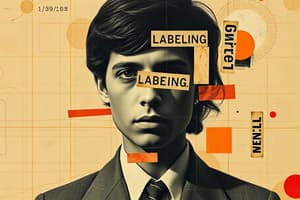Podcast
Questions and Answers
Which sociologist is most closely associated with the development of labelling theory?
Which sociologist is most closely associated with the development of labelling theory?
- Emile Durkheim
- Max Weber
- Howard Becker (correct)
- Karl Marx
Labelling theory suggests that a self-fulfilling prophecy is an inevitable outcome of negative labeling.
Labelling theory suggests that a self-fulfilling prophecy is an inevitable outcome of negative labeling.
False (B)
What is the 'halo effect' in the context of teacher labelling?
What is the 'halo effect' in the context of teacher labelling?
The halo effect refers to the positive perception and differential treatment a student receives due to a positive label, even when their behavior might warrant otherwise.
The term ________ refers to categorizing pupils into groups who will achieve anyway, hopeless cases, and borderline cases.
The term ________ refers to categorizing pupils into groups who will achieve anyway, hopeless cases, and borderline cases.
Match the following concepts with their descriptions:
Match the following concepts with their descriptions:
What was the primary finding of Rosenthal and Jacobson's 'Pygmalion in the Classroom' study?
What was the primary finding of Rosenthal and Jacobson's 'Pygmalion in the Classroom' study?
According to Willis, 'the lads' conformed to the school's expectations and formed a pro-school subculture.
According to Willis, 'the lads' conformed to the school's expectations and formed a pro-school subculture.
What is the difference between 'setting' and 'streaming' in the context of education?
What is the difference between 'setting' and 'streaming' in the context of education?
The ________ curriculum refers to the subtle, often unstated norms and values taught in schools.
The ________ curriculum refers to the subtle, often unstated norms and values taught in schools.
What is a potential ethical issue with repeating the Rosenthal and Jacobson experiment?
What is a potential ethical issue with repeating the Rosenthal and Jacobson experiment?
Postmodernists primarily view subcultures as being defined strictly by social class and attitudes toward school.
Postmodernists primarily view subcultures as being defined strictly by social class and attitudes toward school.
What is the term used when schools try to disguise that banding is occurring?
What is the term used when schools try to disguise that banding is occurring?
According to Gilborn and Youdell, what is the effect of school league tables on approaches to students? (Choose the best)
According to Gilborn and Youdell, what is the effect of school league tables on approaches to students? (Choose the best)
According to postmodernists, identity is increasingly a mater of ________.
According to postmodernists, identity is increasingly a mater of ________.
Match the sociologists with the subculture study:
Match the sociologists with the subculture study:
What concept studied by sociological theorists examines how the education system leads to working-class kids doing woking-class jobs?
What concept studied by sociological theorists examines how the education system leads to working-class kids doing woking-class jobs?
Interactionist sociologists account for structural reasons when studying the impacts of labelling.
Interactionist sociologists account for structural reasons when studying the impacts of labelling.
Give an example of a Hidden Curriculum as it applies in education.
Give an example of a Hidden Curriculum as it applies in education.
__________ is thought to reproduce class inequalities but not being as Marxist as Bowles and Gintis.
__________ is thought to reproduce class inequalities but not being as Marxist as Bowles and Gintis.
What is the description of Banding as it relates to school policies?
What is the description of Banding as it relates to school policies?
Flashcards
Labelling Theory
Labelling Theory
Teachers apply labels to pupils regarding ability, potential, or behavior, influencing outcomes.
Self-fulfilling Prophecy
Self-fulfilling Prophecy
A prediction that causes itself to become true due to the behavior of the believer.
Halo Effect
Halo Effect
If labelled positively, a student's behavior is interpreted favorably, avoiding discipline.
Triage
Triage
Signup and view all the flashcards
Anti-School Subcultures
Anti-School Subcultures
Signup and view all the flashcards
Pro-School Subcultures
Pro-School Subcultures
Signup and view all the flashcards
Hidden Curriculum
Hidden Curriculum
Signup and view all the flashcards
Streaming
Streaming
Signup and view all the flashcards
Setting
Setting
Signup and view all the flashcards
Banding
Banding
Signup and view all the flashcards
Study Notes
- Relationships and processes within schools include teacher/pupil relationships, pupil identities and subcultures, the hidden curriculum, and the organization of teaching and learning.
Labelling Theory
- Labelling theory, developed by Howard Becker, examines how teachers' labels affect pupils' ability, potential, or behavior.
- Labels can be positive or negative, leading to a self-fulfilling prophecy, influencing a student's achievement.
- The theory is interactionist and suggests that labels are not always internalized; students can reject them, leading to a self-refuting prophecy.
- A student labeled as a failure may internalize and fail, or become determined to prove the teacher wrong.
Rosenthal and Jacobson: "Pygmalion in the Classroom" (1965)
- This study explored the impact of labelling in elementary schools in the USA.
- Teachers were given randomly generated results suggesting some students were "spurters," while others were in a control group.
- Pupils identified as "spurters" showed greater development than the control group, supporting the self-fulfilling prophecy.
- Ethical concerns exist regarding experimenting on children and interfering with their education in this manner.
- Teachers often have an "ideal pupil" model, which can lead to the "halo effect," where positively labeled students receive more lenient treatment.
Triage in Schools
- Gilborn and Youdell argue that schools categorize pupils into those who will always succeed, hopeless cases, and borderline cases needing extra support.
- School triage is linked to the pressure of maintaining league table positions and the A*-C rate.
- Labelling can directly impact pupils' educational experiences and outcomes.
Evaluating Labelling Theory
- It's difficult to prove how teachers label pupils, how much pupils realize the labels, and the impact those labels have.
- Interactionist sociologists do not focus on structural reasons for labelling.
- Working-class pupils and pupils from minority-ethnic groups are more likely to receive negative labels.
- Mirza found labeling motivated black girls to succeed, showing a possible self-refuting prophecy.
Pupil Subcultures
- Paul Willis studied working-class schoolboys ("the Lads") and their attitudes towards school.
- "The Lads" subverted school values, valuing "mucking about" over academic success.
- They saw school as being for middle-class kids and aimed to get through it until they could leave and get a job.
- Pro-school subcultures involve students who support the school's ethos, rules, and principles, valuing hard work and academic success.
- Some subcultures, like those identified by Mirza and Mac an Ghaill, are anti-school in terms of the institution but pro-education.
Evaluating Studies of Pupil Subcultures
- Post-modernists view subcultures as cultural identity expressions rather than linked to achievement or attitudes, defined more by music or fashion preferences.
- Willis studied subcultures to understand how the education system reproduces class inequalities.
Pupil Identities
- Pupil identities are complex, influenced by factors inside and outside school, with increasing matter of choice
- Identities are shaped by ethnicity, gender, social class, and interactions with peers and teachers.
- Postmodernists argue that identity is a matter of choice, influenced by consumption patterns like music or fashion.
The Hidden Curriculum
- The hidden curriculum involves the subtle teaching of norms and values in schools.
- Functionalists see it as necessary for society to function, while conflict theorists view it as teaching people to accept capitalism or patriarchy.
- This includes learning manners, respecting authority, and understanding hierarchy.
Setting, Streaming and Banding
- Setting places students into groups based on ability, but it can vary by subject.
- Streaming splits pupils into groups based on overall ability across all subjects.
- Banding groups pupils of similar academic ability together.
- Critics argue that banding and streaming show selection by academic ability still exists in comprehensive schools.
- Being placed in a low set can cause students to underperform or try hard to move into a higher set.
- Neutral names for streams can disguise banding.
Links to Core Themes
- The topic links to culture and identity, with schools having potential for diverse subcultures and processes within schools and relationships with teachers and peers further shaping students' identities.
- Stratification is relevant, adding detail to "in-school factors".
Studying That Suits You
Use AI to generate personalized quizzes and flashcards to suit your learning preferences.




